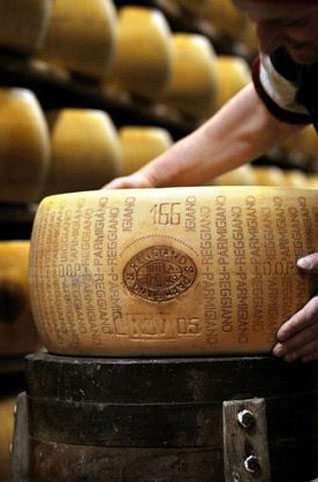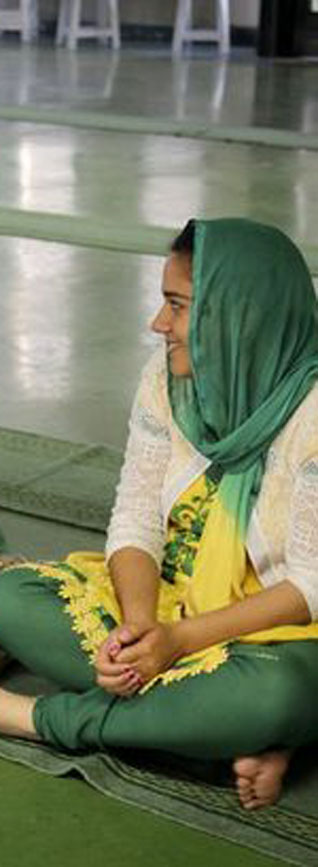Cuisine
The Sikhs Who Saved Parmesan
DANY MITZMAN, BBC
What do Punjab and Italy's Po Valley have in common?
More than you might imagine, which explains why immigrant Sikhs from the Land of The Five Rivers became the backbone of Italy's most famous cheese-making industry.
On the flat planes of the Po Valley is the small town of Novellara, in the province of Reggio Emilia. It's not far from the city of Parma - and from Parma and Reggio Emilia comes the name of one of the world's most famous cheeses, Parmigiano Reggiano... in English, Parmesan.
Under EU (European Union) rules, it has to be made exclusively from milk produced and transformed into cheese in this area of northern Italy.
The large number of Sikhs who have settled here were not attracted by the territory's famous product but rather by the territory itself, explains Novellara's mayor, Elena Carletti.
"They say, 'We live here and we feel like we're still in Punjab because it's flat, there are no mountains, it's hot, it's humid, and the kind of agriculture is more or less the same.'"
According to the mayor, Sikhs feel comfortable in their Italian home from home.
"Punjab, which means 'the land of five rivers', is an agricultural land," confirms Amritpal Singh, whose family moved to Italy when he was five years old. "At home we have fields and cows, and our relationship with the land and animals is very particular. So, when we came here and didn't know the language, this was something in our favour."
With the first major wave of immigration in the 1980s, some went to work for the circus, others in factories, but the majority chose dairy farming. Aside from not needing to speak Italian to milk and take care of cows, Amritpal says they were not afraid of hard work or the unsociable hours.
"We wake up very early to pray so that's why it works for us," he says.
A typical day involves two shifts - approximately 4 am - 8 am then 2.30 pm to 6.30 pm. It's common for people to work seven days a week with no holidays, as cows need to be milked every day. Local dairy farmers were impressed by the respect and skill with which the Sikhs handled their animals. The immigrant workers were impressed by the handsome wages and free housing their employers offered. The economy was booming back then and many Italians were turning their backs on what was considered menial, unskilled work.
"If you go to almost any dairy farm round here, you'll find Sikhs working in the cow sheds," says dairy farmer Maurizio Novelli, though he emphasises that they don't actually make the cheese. Novelli, whose father and grandfather were dairy farmers, has had the same Sikh husband-and-wife team working for him for 15 years and recently took on their brother-in-law too. Unusually, they get a day off, holidays and seasonal bonuses.
"They really want to work. We have a good relationship with mutual respect," he says.
According to mayor Elena Carletti, the immigrant labour force has been fundamental to maintaining and preserving traditional cheese production: "It would be impossible to think of this industry without the support of people from Punjab," she says.
But the story of Novellara's Sikh community is about much more than cheese. If they are still here it is largely thanks to the welcome they received from the local community. Keen to listen to the needs of immigrant communities, the municipality was the first in Italy to grant permission to build a Gurdwara by allowing an industrial plot to be used for religious purposes.
Opened in 2000 by Romano Prodi, the former Italian Prime Minister and European Commission President, the Gurdwara is considered among the most important in Europe. The oldest and one of the largest, it is soon to expand further, says Carletti, whose office recently approved the plans.
When the area was hit by earthquakes in 2012, the Sikh community cooked and took food to the victims twice a day. Earlier this year, they donated a car for blood transportation to the Red Cross.
"Some of them volunteer for Civil Protection," says Carletti. "They are part of our community. They are Italians."
At the Gurdwara, Sikhs like Sukhwinder - who came to Italy seven years ago - say they notice a difference in attitudes toward them in this part of the country.
"Those who see us for the first time think we're terrorists or Taliban. That's really hard for us. Here people know us. They are really nice."
Amritpal remembers how effortlessly he explained his long hair and turban to curious school friends, and says they have come a long way since his grandfather's generation removed their turbans and cut their hair short to fit in. He sees himself as Sikh-Italian "because you can't cut your roots so I keep them alive inside me, but the rest is Italian."
Even from a culinary perspective, he enjoys both cultures.
“… I don't eat meat but at home we eat both Punjabi and Italian, and we often go out to eat."
And their meals, of course, include Parmigiano Reggiano.
But successful integration may, in the long term, put the local cheese industry at risk again.
At the town hall, located inside Novellara's mediaeval fortress, Elena Carletti is about to perform a civil marriage service for a young Sikh couple. Raman and Maninder admit they are less nervous than they were for their religious ceremony last week, when they had 300 guests.
Today they have just two witnesses, Raman's parents, but consider their civil union important too.
"Having been born and brought up here, we feel Italian," says Raman, "If we go abroad, we compare other cultures to Italy, not India."
The mayor confesses she imagined they would honeymoon in Punjab. Instead they are going to California, Hawaii and Las Vegas. This is the new generation of Sikhs in Novellara, who speak with the local accent and have the same aspirations as their Italian peers. Raman has an office job at an international transport company. Maninder works for a chemical lab. They are among the majority that doesn't want to milk cows for a living.
Sikhs currently make up about 60% of the Parmesan-producing workforce, although there are workers from other countries too. The economic recession has already had a serious impact on business and most farmers can no longer afford to offer free housing to their workers. If the grassroots support of the Sikh community diminishes, what will become of this celebrated cheese industry?
Elena Carletti is philosophical. After every wedding she presents a gift bottle of traditional balsamic vinegar to the happy couple - another prized local product, and one that once seemed destined to disappear. But several of her friends, finding themselves jobless in recent years, have rediscovered their grandparents' old barrels and are returning to production.
"We Italians are thinking about the origins and the importance of food and nature," she says. "Many young people are trying to go back to agriculture."
In other words, Parmigiano Reggiano's next saviours may not come from Punjab but from the Po Valley itself.
HOW PARMESAN GOT ITS NAME
Monks near Parma started making the cheese in the Middle Ages - it became known, in Latin, as caseum paramensis, shortened to Pramsan in the local dialect
The 14th Century writer Giovanni Boccaccio tells a story in ‘The Decameron’ about a gourmet paradise called Bengodi, where cooks roll macaroni down a mountain of grated Parmesan, to coat it in the snowy powder
By the 1530s, Italian nobles began to refer to the cheese as Parmesano, meaning "of or from Parma"
This was shortened to Parmesan by the French courts of the day (though fromage de Parme was also used)
In Italy some producers called their cheese Parmigiano, others called it Reggiano until 1954, when it all officially became Parmigiano Reggiano.
[Courtesy: BBC. Edited for sikhchic.com]
June 25, 2015





